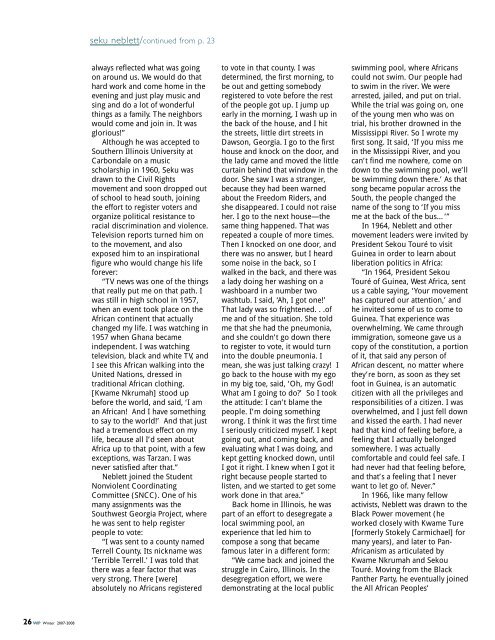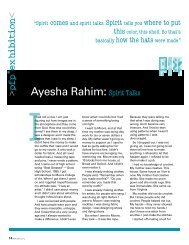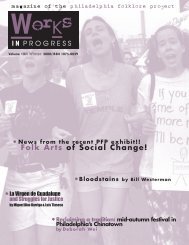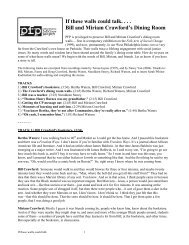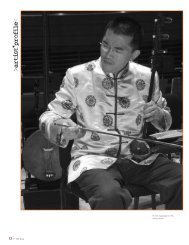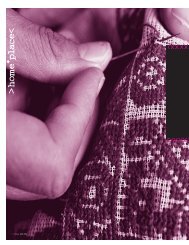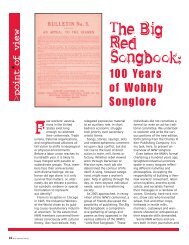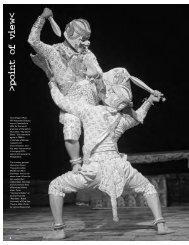African song / Fatu Gayflor ⢠War and wealth - Philadelphia Folklore ...
African song / Fatu Gayflor ⢠War and wealth - Philadelphia Folklore ...
African song / Fatu Gayflor ⢠War and wealth - Philadelphia Folklore ...
Create successful ePaper yourself
Turn your PDF publications into a flip-book with our unique Google optimized e-Paper software.
seku neblett/continued from p. 23<br />
always reflected what was going<br />
on around us. We would do that<br />
hard work <strong>and</strong> come home in the<br />
evening <strong>and</strong> just play music <strong>and</strong><br />
sing <strong>and</strong> do a lot of wonderful<br />
things as a family. The neighbors<br />
would come <strong>and</strong> join in. It was<br />
glorious!”<br />
Although he was accepted to<br />
Southern Illinois University at<br />
Carbondale on a music<br />
scholarship in 1960, Seku was<br />
drawn to the Civil Rights<br />
movement <strong>and</strong> soon dropped out<br />
of school to head south, joining<br />
the effort to register voters <strong>and</strong><br />
organize political resistance to<br />
racial discrimination <strong>and</strong> violence.<br />
Television reports turned him on<br />
to the movement, <strong>and</strong> also<br />
exposed him to an inspirational<br />
figure who would change his life<br />
forever:<br />
“TV news was one of the things<br />
that really put me on that path. I<br />
was still in high school in 1957,<br />
when an event took place on the<br />
<strong>African</strong> continent that actually<br />
changed my life. I was watching in<br />
1957 when Ghana became<br />
independent. I was watching<br />
television, black <strong>and</strong> white TV, <strong>and</strong><br />
I see this <strong>African</strong> walking into the<br />
United Nations, dressed in<br />
traditional <strong>African</strong> clothing.<br />
[Kwame Nkrumah] stood up<br />
before the world, <strong>and</strong> said, ‘I am<br />
an <strong>African</strong>! And I have something<br />
to say to the world!’ And that just<br />
had a tremendous effect on my<br />
life, because all I’d seen about<br />
Africa up to that point, with a few<br />
exceptions, was Tarzan. I was<br />
never satisfied after that.”<br />
Neblett joined the Student<br />
Nonviolent Coordinating<br />
Committee (SNCC). One of his<br />
many assignments was the<br />
Southwest Georgia Project, where<br />
he was sent to help register<br />
people to vote:<br />
“I was sent to a county named<br />
Terrell County. Its nickname was<br />
‘Terrible Terrell.’ I was told that<br />
there was a fear factor that was<br />
very strong. There [were]<br />
absolutely no <strong>African</strong>s registered<br />
to vote in that county. I was<br />
determined, the first morning, to<br />
be out <strong>and</strong> getting somebody<br />
registered to vote before the rest<br />
of the people got up. I jump up<br />
early in the morning, I wash up in<br />
the back of the house, <strong>and</strong> I hit<br />
the streets, little dirt streets in<br />
Dawson, Georgia. I go to the first<br />
house <strong>and</strong> knock on the door, <strong>and</strong><br />
the lady came <strong>and</strong> moved the little<br />
curtain behind that window in the<br />
door. She saw I was a stranger,<br />
because they had been warned<br />
about the Freedom Riders, <strong>and</strong><br />
she disappeared. I could not raise<br />
her. I go to the next house—the<br />
same thing happened. That was<br />
repeated a couple of more times.<br />
Then I knocked on one door, <strong>and</strong><br />
there was no answer, but I heard<br />
some noise in the back, so I<br />
walked in the back, <strong>and</strong> there was<br />
a lady doing her washing on a<br />
washboard in a number two<br />
washtub. I said, ‘Ah, I got one!’<br />
That lady was so frightened. . .of<br />
me <strong>and</strong> of the situation. She told<br />
me that she had the pneumonia,<br />
<strong>and</strong> she couldn’t go down there<br />
to register to vote, it would turn<br />
into the double pneumonia. I<br />
mean, she was just talking crazy! I<br />
go back to the house with my ego<br />
in my big toe, said, ‘Oh, my God!<br />
What am I going to do?’ So I took<br />
the attitude: I can’t blame the<br />
people. I’m doing something<br />
wrong. I think it was the first time<br />
I seriously criticized myself. I kept<br />
going out, <strong>and</strong> coming back, <strong>and</strong><br />
evaluating what I was doing, <strong>and</strong><br />
kept getting knocked down, until<br />
I got it right. I knew when I got it<br />
right because people started to<br />
listen, <strong>and</strong> we started to get some<br />
work done in that area.”<br />
Back home in Illinois, he was<br />
part of an effort to desegregate a<br />
local swimming pool, an<br />
experience that led him to<br />
compose a <strong>song</strong> that became<br />
famous later in a different form:<br />
“We came back <strong>and</strong> joined the<br />
struggle in Cairo, Illinois. In the<br />
desegregation effort, we were<br />
demonstrating at the local public<br />
swimming pool, where <strong>African</strong>s<br />
could not swim. Our people had<br />
to swim in the river. We were<br />
arrested, jailed, <strong>and</strong> put on trial.<br />
While the trial was going on, one<br />
of the young men who was on<br />
trial, his brother drowned in the<br />
Mississippi River. So I wrote my<br />
first <strong>song</strong>. It said, ‘If you miss me<br />
in the Mississippi River, <strong>and</strong> you<br />
can’t find me nowhere, come on<br />
down to the swimming pool, we’ll<br />
be swimming down there.’ As that<br />
<strong>song</strong> became popular across the<br />
South, the people changed the<br />
name of the <strong>song</strong> to ‘If you miss<br />
me at the back of the bus…’”<br />
In 1964, Neblett <strong>and</strong> other<br />
movement leaders were invited by<br />
President Sekou Touré to visit<br />
Guinea in order to learn about<br />
liberation politics in Africa:<br />
“In 1964, President Sekou<br />
Touré of Guinea, West Africa, sent<br />
us a cable saying, ‘Your movement<br />
has captured our attention,’ <strong>and</strong><br />
he invited some of us to come to<br />
Guinea. That experience was<br />
overwhelming. We came through<br />
immigration, someone gave us a<br />
copy of the constitution, a portion<br />
of it, that said any person of<br />
<strong>African</strong> descent, no matter where<br />
they’re born, as soon as they set<br />
foot in Guinea, is an automatic<br />
citizen with all the privileges <strong>and</strong><br />
responsibilities of a citizen. I was<br />
overwhelmed, <strong>and</strong> I just fell down<br />
<strong>and</strong> kissed the earth. I had never<br />
had that kind of feeling before, a<br />
feeling that I actually belonged<br />
somewhere. I was actually<br />
comfortable <strong>and</strong> could feel safe. I<br />
had never had that feeling before,<br />
<strong>and</strong> that’s a feeling that I never<br />
want to let go of. Never.”<br />
In 1966, like many fellow<br />
activists, Neblett was drawn to the<br />
Black Power movement (he<br />
worked closely with Kwame Ture<br />
[formerly Stokely Carmichael] for<br />
many years), <strong>and</strong> later to Pan-<br />
<strong>African</strong>ism as articulated by<br />
Kwame Nkrumah <strong>and</strong> Sekou<br />
Touré. Moving from the Black<br />
Panther Party, he eventually joined<br />
the All <strong>African</strong> Peoples’<br />
26 WIP Winter 2007-2008


